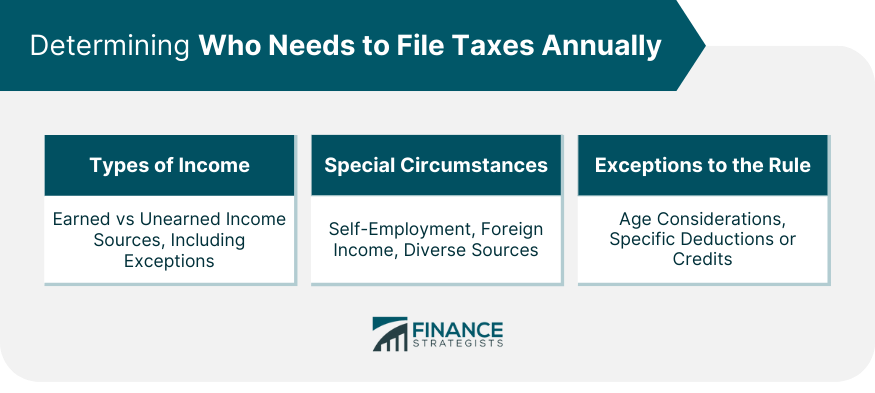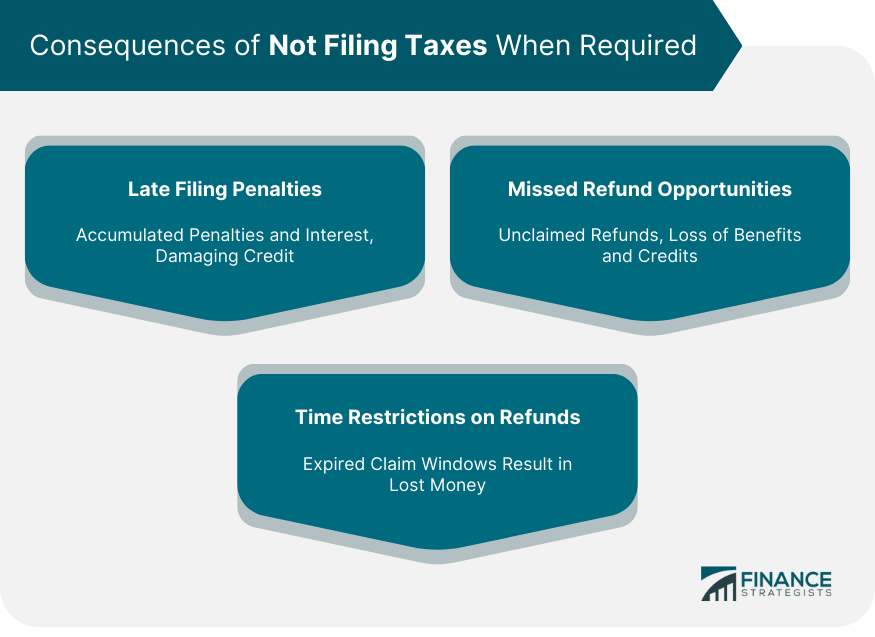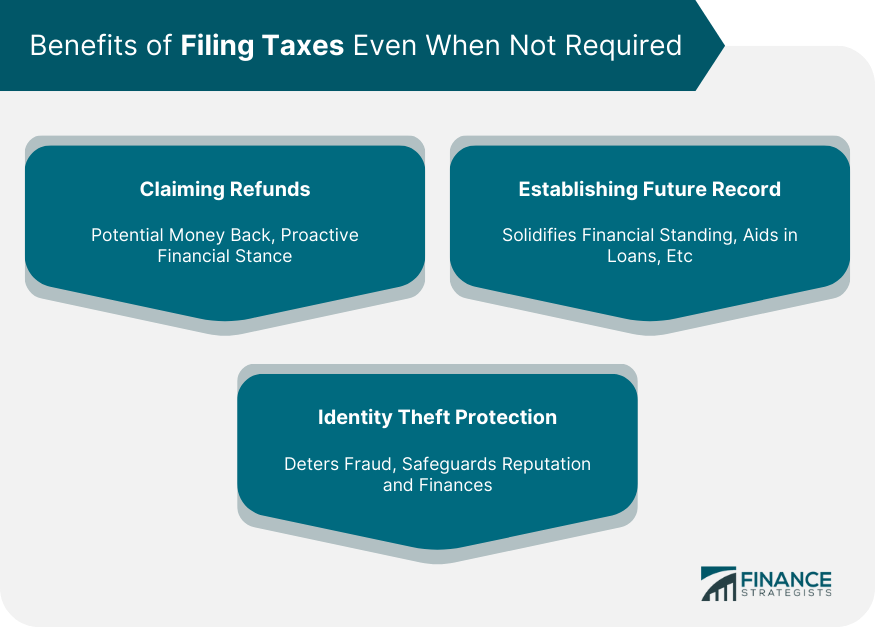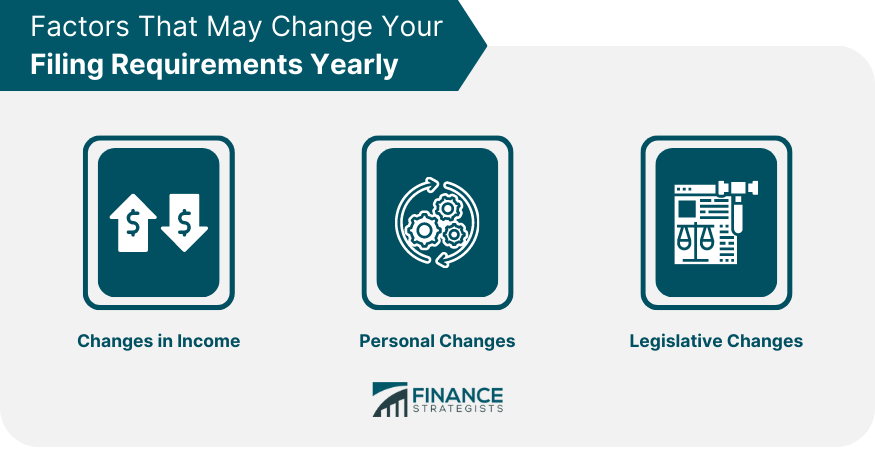Whether you need to file taxes every year depends on various factors, including your income level, age, filing status, and the types of income you receive. Generally, if your income surpasses specific thresholds set by tax authorities, you're required to file a tax return. For instance, the IRS sets income limits based on filing statuses such as single, married, filing jointly, or head of household. Also, certain types of unearned income, like dividends or rental revenue, might necessitate filing even if the amounts are modest. Special situations, such as self-employment or earning foreign income, may also have distinct filing requirements. Additionally, even if not mandated, it's sometimes beneficial to file to claim potential refunds or specific tax credits. It's always a good idea to consult tax guidelines or a professional to determine your specific obligation. The IRS and tax authorities in other countries often set income thresholds for each filing status. If your income surpasses this amount, you must file a tax return. For example, single filers under 65 in a particular year might have a different threshold than married couples filing jointly. It's not just how much you earn but where that income comes from. Earned income, which you get from employment or self-employment, often has different rules than unearned income, such as dividends or rental income. Unearned income might trigger the need to file, even if it's relatively modest. Every rule tends to have its exceptions. For instance, self-employed individuals need to file if their income exceeds a specific threshold. Similarly, if you have foreign income, certain regulations apply. Diverse income sources, such as gambling winnings or a combination of different revenue streams, often necessitate consulting a tax expert to ensure accurate filing. Older adults might have different requirements. For instance, the income threshold might be higher for those over 65. Similarly, young people, especially if they're claimed as dependents, might have lower thresholds that require them to file. Sometimes, even if your income is below the standard threshold, you'll want to (or need to) file to claim certain tax credits or deductions. An example might be the Earned Income Tax Credit (EITC) in the U.S. Tax agencies are stringent about their deadlines. Delaying or neglecting to file when you owe taxes typically results in accumulating penalties and accruing interest on the unpaid sum. Not only does this inflate your owed amount, but consistent neglect can also adversely affect your financial reputation or credit score. It's essential to remember that these penalties can vary based on how late the filing is and the owed amount. Thus, prompt attention can prevent a small oversight from becoming a significant financial burden. When it comes to overpaid taxes, the responsibility to claim a refund lies with you. If the tax authorities owe you a refund, it remains unclaimed until you file the necessary return. Apart from the immediate financial disadvantage, failing to file could also mean you miss out on any potential future benefits or credits associated with that refund. Moreover, consistently unclaimed refunds may raise red flags, leading to closer scrutiny of your financial affairs. Every jurisdiction has rules around how long you have to claim a tax refund. While many places, like the U.S., offer a three-year window, once this period expires, you forfeit your right to that money. Imagine realizing you were owed a substantial sum but had just crossed the time threshold; the loss can be frustrating. Additionally, understanding these time limits can be crucial when planning financial moves, ensuring you're maximizing your potential returns. Overpayment of taxes or qualify for specific tax credits might mean the government owes you. Not only does this signify potential money back in your pocket, but timely filing ensures you aren't leaving money on the table that could be invested or used elsewhere. Additionally, actively seeking refunds emphasizes a proactive financial approach, positioning you as someone who's on top of their financial obligations. A consistent tax filing record, even when it's not mandatory, solidifies your financial footprint. Whether you're eyeing a new home, contemplating a business loan, or navigating other pivotal financial junctures, a transparent tax history showcases your reliability and commitment to fiscal accountability. Many financial institutions and lenders also look favorably on a comprehensive tax record, as it often simplifies the evaluation and approval processes. By establishing a record each year, you deter potential fraudulent activities under your name. If a scammer attempts to file a deceptive return using your details, the tax system identifies the inconsistency, alerting authorities to potential foul play. This not only guards your financial identity but also ensures that your hard-earned reputation remains untarnished. Change is the only constant, they say. Your need to file can fluctuate based on the following: Changes in Income: Whether you've experienced a significant salary boost, accepted a lower-paying role, faced unemployment, or embarked on a business venture, these shifts in earnings can influence your tax bracket and determine how you file. Personal Changes: Celebrating a wedding, welcoming a baby, or navigating through a divorce are more than just pivotal life events. Each of these milestones carries its own set of tax ramifications. Legislative Changes: Tax codes are dynamic, not static. As governments modify tax rates, adjust brackets, and refine deductions and credits, staying informed about these alterations is key to ensuring a smoother tax experience and potentially saving funds in the process. If you're lost in the labyrinth of tax rules, fear not! Assistance is available. IRS’s Interactive Tax Assistant (Or Equivalent in Other Jurisdictions): A handy online tool that guides you through a series of questions to determine your filing status and need. Consulting a Tax Professional or Accountant: When in doubt, turn to the pros. They're up to date with the latest changes and nuances in the tax world. Online Tax Software: Modern tax software is intuitive and user-friendly. As you enter your details, they can guide your decision on whether to file or not. Determining the need to file taxes annually is contingent upon numerous factors like income levels, personal changes, and the types of income accrued. However, understanding the intricacies is pivotal, as non-compliance can result in hefty penalties, while proactive filing can offer potential refunds. Personal milestones such as marriage or the birth of a child can significantly influence tax obligations, highlighting the dynamic nature of tax laws. With changing legislative landscapes, staying updated is crucial. Leveraging resources like tax professionals or modern software can help navigate this maze, ensuring fiscal responsibility and safeguarding one's financial health. Whether mandated or not, establishing a consistent tax record not only portrays fiscal diligence but also protects against fraud, emphasizing the multi-faceted importance of this annual exercise.Do You Need to File Taxes Every Year?
Determining the Need to File Taxes Annually
Who Is Required to File?
Income Thresholds Based on Filing Status
Types of Income
Special Circumstances
Exceptions to the Rule
Age Considerations
Specific Tax Deductions or Credits

Consequences of Not Filing Taxes When Required
Late Filing Penalties and Interest
Missed Opportunities for Refunds
Time Restrictions on Refund Claims

Benefits of Filing Taxes Even When Not Required
Claiming Refunds
Establishing a Record for Future Financial Needs
Protecting Against Identity Theft

Factors That May Change Your Filing Requirements Yearly

Tools and Resources for Determining Your Tax Filing Requirement
Bottom Line
Do You Need to File Taxes Every Year? FAQs
Not necessarily. Whether you need to file depends on the amount of earned income and the filing status. Each status, such as single or married filing jointly, has specific income thresholds that determine the need to file.
If you owe money and fail to file, you'll likely accrue penalties and interest on the unpaid amount. The longer you delay, the more these charges can increase your overall tax bill.
Even if your income is below the threshold, you might want to file to claim specific tax credits or deductions that could result in a refund. Moreover, filing can establish a tax record and protect against potential identity theft.
Yes. Personal milestones like marriage, divorce, or having a child can influence your tax filing status and eligibility for certain credits or deductions, which might require or benefit from filing a tax return.
You can use tools like the IRS's Interactive Tax Assistant or consult a tax professional. Additionally, many online tax software programs guide you through the process and help determine if filing is necessary based on your specific circumstances.
True Tamplin is a published author, public speaker, CEO of UpDigital, and founder of Finance Strategists.
True is a Certified Educator in Personal Finance (CEPF®), author of The Handy Financial Ratios Guide, a member of the Society for Advancing Business Editing and Writing, contributes to his financial education site, Finance Strategists, and has spoken to various financial communities such as the CFA Institute, as well as university students like his Alma mater, Biola University, where he received a bachelor of science in business and data analytics.
To learn more about True, visit his personal website or view his author profiles on Amazon, Nasdaq and Forbes.











